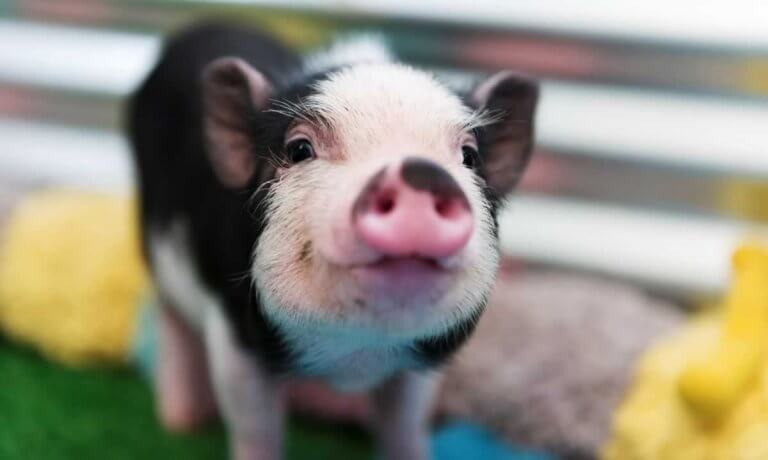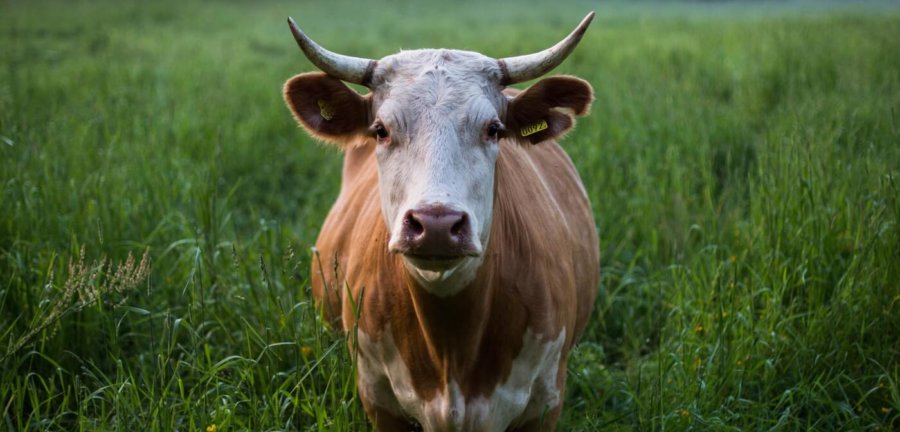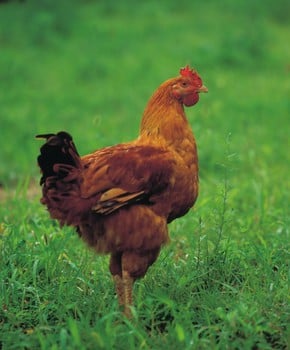Does God want us to eat animals? Does He care whether we’re kind or cruel to them? Let’s look to the Bible for answers.

According to the first book of the Torah and Old Testament, God created animals before humans, and He saw them as good (Genesis 1:24–26). He told the humans to “[r]eign over the fish in the sea, the birds in the sky, and all the animals that scurry along the ground” (Genesis 1:27). He then told them to eat plants: “I have given you every seed-bearing plant throughout the earth and all the fruit trees for your food” (Genesis 1:29).
God’s first home for humans was Eden, and it was a vegan paradise. He told them, “You may freely eat the fruit of every tree in the garden” (Genesis 2:15–16). When they disobeyed Him, they were expelled from paradise. Because they continued to disobey, He flooded the Earth, made animals fear humans, and gave Noah permission to eat animals (Genesis 9:2–3). But God never instructed anyone else to eat them, and without any reason offered for giving this permission to Noah, it’s reasonable to presume that He did so out of necessity, because there may have been no other food available immediately after the flood.
God endowed humans with the ability to eat both meat and plants, but just because we can eat something doesn’t mean that we should. The better question is what would He want us to eat today, given the effect of this choice on our health, our planet, and our fellow creatures?
God created humans from earth (Genesis 2:7), and the essential elements that our bodies require are found in the soil. These nutrients are replenished by the plants that God gave us to consume, which include over 20,000 edible fruits, vegetables, herbs, spices, beans, legumes, nuts, and seeds. As demonstrated by Daniel in the Bible, humans are often healthier when they consume vegetables rather than meat (Daniel 1:8–16)—and modern science has confirmed that plants can provide all humans with healthy, complete nutrition. Achieving optimal health through vegan eating can also enable us to have longer, happier, and healthier lives, attracting others to the Lord through our good example.
God’s covenant with Noah also included animals: “I hereby confirm my covenant with you and your descendants, and with all the animals that were on the boat with you—the birds, the livestock, and all the wild animals—every living creature on earth” (Genesis 9:9–10). Other Bible verses show that God cares about all animals—for example, Matthew chapter 6 says, “Look at the birds. They don’t plant or harvest or store food in barns, for your heavenly Father feeds them” (6:26). In Ecclesiastes, God proclaims, “For people and animals share the same fate—both breathe and both must die. So people have no real advantage over the animals” (3:19). He continues, “For who can prove that the human spirit goes up and the spirit of animals goes down into the earth?” (3:21).
Does anything in the Bible tell us that we must eat animals? No. But there are examples in the Bible of people eating meat. Does that mean that we should eat meat today? There are also examples in the Bible of rape (2 Samuel 13:14), incest (Genesis 19:30–36), genocide (1 Samuel 15:3), and slavery (Leviticus 25:44–46), but no rational person would attempt to advocate these practices today simply because they occur in the Bible.

©iStock.com/HadelProductions
Jesus called his first disciples away from careers as anglers and recruited them to become fishers of men instead (Matthew 4:18–20). When Jesus multiplied bread and a few fish to feed thousands, the Bible doesn’t say that He killed the fish—only that He multiplied already dead ones, out of necessity, to feed hungry people (Luke 9:12–17, John 6:1–14, Matthew 15:32–39, and Mark 8:1–9). Jesus did say that humans should be good shepherds: “The good shepherd sacrifices his life for the sheep” (John 10:11). A good shepherd would not engage in cruelty to animals or modern factory farming practices—in which sentient beings are constrained in unnatural, inhumane conditions and slaughtered far short of their species’ natural life expectancy—because necessity doesn’t require us to eat meat to survive, and healthier plant-derived foods are widely available.
When Jesus was asked to name the most important commandment, He answered that the first is to love God with all your heart but the second is equally important: “Love your neighbor as yourself” (Matthew 22:36–40). We cannot practice this teaching if we eat animals when vegan options are abundant, because animal agriculture is harming our planet and neighbors. According to the United Nations, the environmental damage caused by animal agriculture is more harmful to the planet than the effect of all fuel used for transportation worldwide. And 82 percent of the world’s starving children live in countries where grain is fed to animals who are killed and shipped to other countries, such as the U.S., for consumption by wealthier people. Given these consequences, would Jesus eat animals and contribute to this harm? No, He would choose to eat food that doesn’t harm the planet or any member of God’s creation.
The Bible is clear that people will be vegan again in the end times, just as we were in paradise: “In that day the wolf and the lamb will live together; the leopard will lie down with the baby goat. The calf and the yearling will be safe with the lion, and a little child will lead them all. The cow will graze near the bear. The cub and the calf will lie down together. The lion will eat hay like a cow” (Isaiah 11:6–9). And Hosea says, “On that day I will make a covenant with all the wild animals and the birds of the sky and the animals that scurry along the ground so they will not harm you” (2:18). Therefore, in the end times, God will repeal the permission that He gave Noah to consume animals and humans will again live in peace together with animals.
Since we live in fallen times, between paradise and the end times, we should aspire to live according to God’s most ideal plan. Just as He has given us His mercy and grace, we should give our mercy to animals. Visit PETA LAMBS to learn more about celebrating the lives of every living, feeling being and answering God’s call to be merciful.
All biblical quotations reference the New Living Translation.







